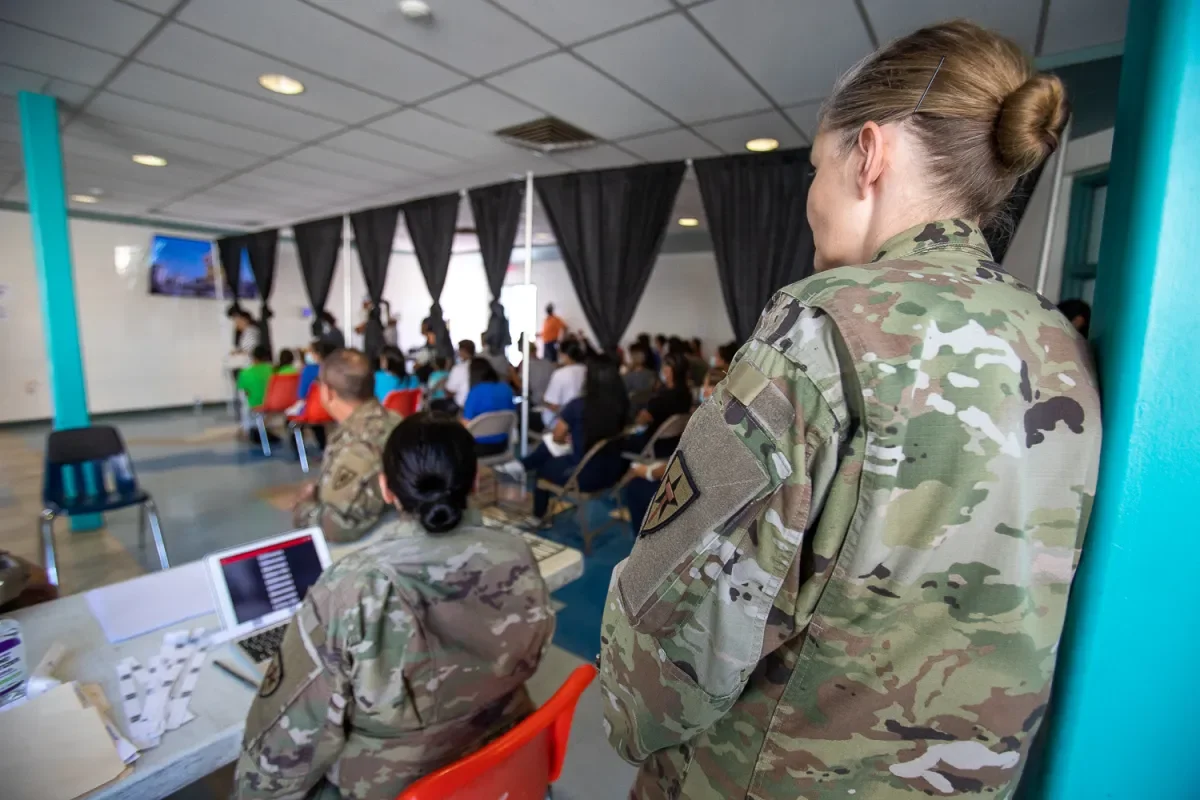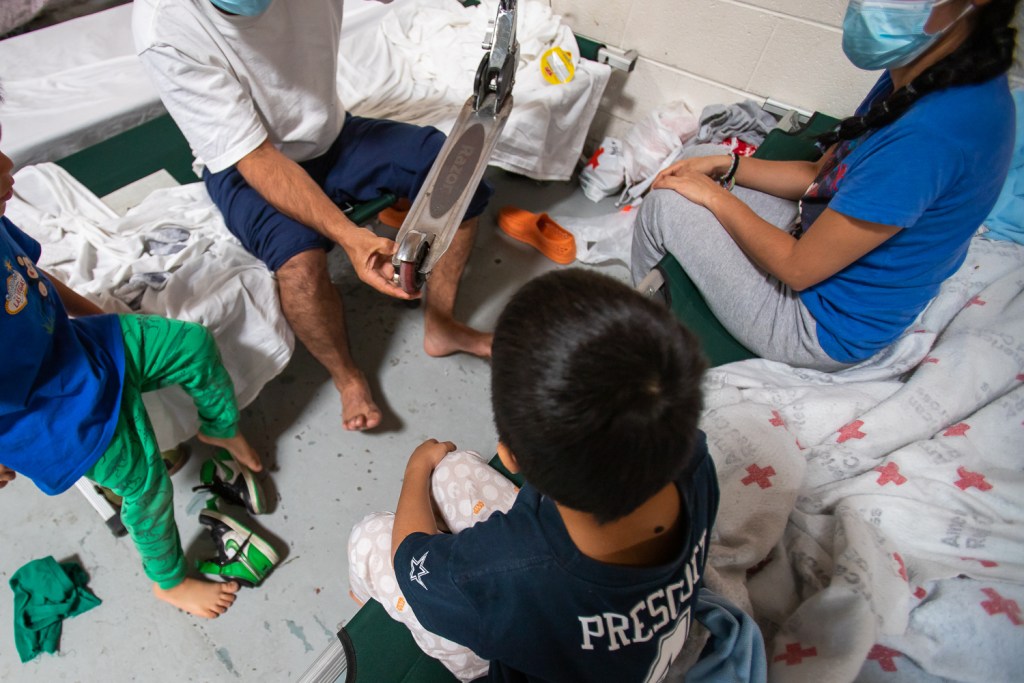After soldiers’ presence, homeless service agency rethinks role as El Paso’s migrant transport hub

The nonprofit organization that has served as the city of El Paso’s hub for busing migrants out of the region is reconsidering its role, particularly following the arrival of the Texas State Guard at its homeless shelter on Monday.
“We are reassessing the situation. We want this to be a smooth operation. There are a lot of things that are on the table,” said John Martin, deputy director of the Opportunity Center of El Paso, which runs the Welcome Center homeless shelter in South El Paso. “But we recognize that the presence of those individuals have caused some concern, especially in light of all of this political unrest that we’re seeing in the state of Texas.”
El Paso Matters spoke to Martin following a Tuesday news conference by city leaders, who said their “federal immigration partners,” referring to the El Paso sector of the U.S Border Patrol, notified the city earlier this month that it would be releasing large numbers of migrants from custody. The city then reached out to the state for help.
Jorge Rodriguez, coordinator of the Office of Emergency Management for the city and county, said city officials on Aug. 23 asked the state for assistance with a charter bus under the condition that the OEM coordinate and retain control of the effort.
“At no time was this operation handed over to the state, and this continues to be our operation,” Rodriguez said.
The city maintaining control of the busing operation would keep it separate from Gov. Greg Abbott’s controversial efforts to bus thousands of migrants to New York City and Washington, D.C.
Abbott’s efforts, which he has said are a response to the Biden administration’s failure to slow border crossings, rely on donations to pay for charter buses out of Texas. Critics have said the busing effort is an election-year stunt by Abbott, a Republican who is being challenged in his bid for a third term as governor by Democrat Beto O’Rourke of El Paso.
El Paso Deputy City Manager Mario D’Agostino added that the city will continue to bus migrants out of the region with the state’s help if needed.
But the Welcome Center has played a pivotal role in organizing migrants for the chartered buses, so it’s unclear what the city would do if the Opportunity Center withdraws from the effort.
El Paso city officials didn’t respond to a request for comment on how they would adjust their efforts to care for migrants if the Opportunity Center is not part of the effort.
The city and the OEM have chartered four buses to New York City since last week, and sponsored one bus to Dallas in June, in an effort to manage the growing number of Central and South America migrants arriving at the border.

The building is being retrofitted to serve as a homeless shelter operated by the Opportunity Center and a group of other nonprofits under a new initiative called El Paso Ayuda that the city expects to launch this fall.
Martin said that the 7,000-square-foot building is too small to meet the needs of the local homeless population alongside the increasing number of unhoused migrants arriving in the city. He said he will make recommendations to the city in the coming days.
The Texas State Guard arrived in El Paso on Monday, with five soldiers helping nonprofits process migrants at the Welcome Center. A few members of the Texas Division of Emergency Management were also present.
Another bus was planned to take migrants to Chicago on Monday, but it was canceled after that destination didn’t garner enough interest to fill it. The migrants there Monday, the majority of them single women, instead received assistance to take flights or commercial buses to other cities or were taken to other area shelters.
Martin said the migrants at the center on Monday were uncomfortable with the soldiers in uniform there, but would not say if he felt that impacted their interest in taking the charter bus to Chicago.

The Texas Military Department confirmed that it was working with its interagency partners in assisting with escort functions in El Paso as part of Abbott’s border security initiative Operation Lone Star. The governor began busing migrants out of Texas in April, transporting 7,400 to Washington, D.C., and 1,500 to New York City as of Friday.
D’Agostino said that aside from chartering buses, the city and the OEM’s response to the migrant influx has included contracting with hotels to house migrants when the Border Patrol's Central Processing Center releases them and area shelters are at capacity.
Migrant encounters on the rise
The U.S. Border Patrol’s Central Processing Center in El Paso has released 50 migrants per day to the city as of Friday, sector officials said in a statement to El Paso Matters on Tuesday. That effort is in coordination with the Enforcement of Removal Office of Immigration and Customs Enforcement.
The migrants are provisionally released pending the next step in their immigration proceedings, reducing the number of migrants in custody.
In recent days, the El Paso sector agents have encountered an average of about 900 migrants daily, officials said. The agency is still expelling migrants under Title 42, a public health law, or placing them under removal proceedings under Title 8, the immigration enforcement law.
El Paso sector officials could not immediately provide a breakdown on how many of those migrants are being expelled in recent weeks. Statistics are typically released mid-month for the month prior.

From October 2021 to July of this year, the El Paso sector recorded nearly 229,000 migrant encounters – an increase of 47% over the same time period the prior fiscal year, according to the latest U.S. Customs and Border Patrol statistics released Aug. 15. In July alone, the region saw 24,900 encounters – up 21% over last year.
Of those total encounters, nearly 60% led to expulsions under Title 42.
“We appreciate the strong alliance of agency and community leaders we have here in El Paso to assist us with irregular migration surges as they arise,” Border Patrol El Paso Sector Chief Gloria I. Chavez said in the statement.
“As we conduct our national security mission and meet the challenges of these irregular migration surges, we do so with the goal of treating everyone in our custody in a respectful, safe and in a humane manner,” she added.
Increasing bed capacity
Ruben Garcia, founder of the Annunciation House migrant shelter in El Paso, said the number of expulsions matter as much as encounters when trying to temporarily house migrants in the more than a dozen shelters in the region. Together, those shelters can typically handle some 380 migrants daily – but only on a few days out of the week. Most shelters run by churches are not available to receive migrants over the weekend.
“This is why it would be so helpful if both the city and the county opened up a hospitality site each,” Garcia said. “That would increase bed capacity. With everyone doing their part, it’s doable.”

Garcia last month shut down Casa del Refugiado, one of the largest migrant shelters in the Southwest, after unsuccessfully urging the city and county governments to take it over. The converted East Side warehouse hosted tens of thousands of migrants over four years.
The Border Network for Human Rights, an advocacy and immigration reform nonprofit based in El Paso, on Tuesday condemned what it called the militarization of the border and asked the city to end its partnership with the state for the transportation of migrants.
BNHR also is urging the city, county and federal governments to invest in what it calls a “welcoming infrastructure in El Paso” and step away from anti-immigrant enforcement strategies it says plays to the invasion narrative.
“The use of military personnel to transport asylum seekers plays into Gov. Abbott's political ambitions,” Fernando Garcia, the organization’s executive director, said in a statement.
This article first appeared on El Paso Matters and is republished here under a Creative Commons license.![]()
